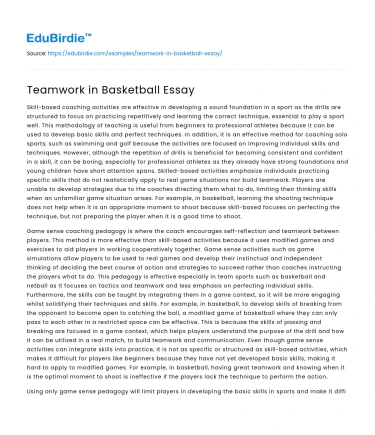Skill-based coaching activities are effective in developing a sound foundation in a sport as the drills are structured to focus on practicing repetitively and learning the correct technique, essential to play a sport well. This methodology of teaching is useful from beginners to professional athletes because it can be used to develop basic skills and perfect techniques. In addition, it is an effective method for coaching solo sports, such as swimming and golf because the activities are focused on improving individual skills and techniques. However, although the repetition of drills is beneficial for becoming consistent and confident in a skill, it can be boring, especially for professional athletes as they already have strong foundations and young children have short attention spans. Skilled-based activities emphasize individuals practicing specific skills that do not realistically apply to real game situations nor build teamwork. Players are unable to develop strategies due to the coaches directing them what to do, limiting their thinking skills when an unfamiliar game situation arises. For example, in basketball, learning the shooting technique does not help when it is an appropriate moment to shoot because skill-based focuses on perfecting the technique, but not preparing the player when it is a good time to shoot.
Game sense coaching pedagogy is where the coach encourages self-reflection and teamwork between players. This method is more effective than skill-based activities because it uses modified games and exercises to aid players in working cooperatively together. Game sense activities such as game simulations allow players to be used to real games and develop their instinctual and independent thinking of deciding the best course of action and strategies to succeed rather than coaches instructing the players what to do. This pedagogy is effective especially in team sports such as basketball and netball as it focuses on tactics and teamwork and less emphasis on perfecting individual skills. Furthermore, the skills can be taught by integrating them in a game context, so it will be more engaging whilst solidifying their techniques and skills. For example, in basketball, to develop skills of breaking from the opponent to become open to catching the ball, a modified game of basketball where they can only pass to each other in a restricted space can be effective. This is because the skills of passing and breaking are focused in a game context, which helps players understand the purpose of the drill and how it can be utilized in a real match, to build teamwork and communication. Even though game sense activities can integrate skills into practice, it is not as specific or structured as skill-based activities, which makes it difficult for players like beginners because they have not yet developed basic skills, making it hard to apply to modified games. For example, in basketball, having great teamwork and knowing when it is the optimal moment to shoot is ineffective if the players lack the technique to perform the action.
Using only game sense pedagogy will limit players in developing the basic skills in sports and make it difficult to apply them in real game situations. Therefore, although game sense offers many benefits like becoming more adapted to real matches, it cannot be done without skill-based activities. Hence, transitioning between the coaching styles is integral to building a balance between solid skills and becoming used to game situations.
For example, when coaching a new basketball team of young players ranging from different skill levels, both styles are essential. Skill-based activities are useful to improve individual, fundamental skills like passing, shooting, and dribbling. New players can learn the basics with the aid of coaches and it can be a refresh and polishing up for experienced players. Transitioning into game sense activities like practice games against each other can build teamwork. Players can try out the new skills they learned in a simulated game situation to aid in developing tactical thinking. The game sense activities help the players understand the purpose of the skills they learn and be able to apply them in a real game situation.
Another situation is for a basketball team that has experienced players and strong foundation skills, game sense activities like practice games are more beneficial as they get to learn to work together, practice tactics, develop quick thinking skills, and try out different game scenarios. The coach can decide to transition to skill-based coaching activities to focus on fundamental skills such as basic passing and dribbling to refresh or refine techniques if they become lacking or unstable.
Based on the comparison between the contrasting teaching models, game sense coaching activities are more effective than skill-based because they allow players of all skill levels to be used to game situations, implement skills in a game context, and along with many benefits like teamwork, communication, tactical thinking, and self-reflective thinking. However, without skill-based activities, athletes would lack sound fundamental skills which will affect them in being able to execute the skills needed in real games. Hence, transitioning between the two teaching methods is effective as it gives players skills and develops a sense of the game. Overall, game sense pedagogy is more effective because it offers more advantages when comparing the two styles of coaching pedagogy.






 Stuck on your essay?
Stuck on your essay?

